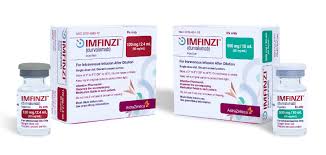
AstraZeneca’s Imfinzi is the latest PD-1/PD-L1 inhibitor to show clinical activity in small cell lung cancer (SCLC), extending survival when used as a first-line therapy in the CASPIAN trial.
The study is looking at Imfinzi (durvalumab) in combination the standard first-line chemotherapy for previously-untreated patients with extensive-stage SCLC, which AZ says is “the most aggressive type of lung cancer.”
The combination extended overall survival compared to etoposide and platinum-based chemotherapy given alone at an interim analysis, according to the drugmaker, which hasn’t yet revealed the data.
SCLC is a notoriously hard-to-treat disease that accounts for up to 15% of all lung cancers, with around 27,000 cases diagnosed each year in the US.
Three other cancer immunotherapies are already approved to treat SCLC, but Imfinzi is the first drug in the class to have data in the first-line setting alongside multiple chemotherapy options, according to AZ’s head of R&D José Baselga.
Most recently, Merck & Co/MSD’s Keytruda (pembrolizumab) was approved by the FDA as a third-line monotherapy for metastatic SCLC, joining Bristol-Myers Squibb’s Opdivo (nivolumab) which got the same okay from the regulator last August.
AZ’s nearest rival in the first-line SCLC setting is Roche, whose Tecentriq (atezolizumab) got a green light from the FDA as a first-line treatment in combination with carboplatin and etoposide for extensive-stage disease.
If AZ can get approval based on the new data, it will make much of the fact that CASPIAN included various first-line chemotherapy regimens, showing its flexibility as a first-line option.
“The phase 3 CASPIAN results offer new hope for patients who are facing the devastating diagnosis of small cell lung cancer, and for whom new medicines are urgently needed,” said Baselga.
Imfinzi is already approved as a second-line maintenance therapy for non-small cell lung cancer (NSCLC), which is more common than SCLC, as well as bladder cancer, with sales rocketing to $295m in the first three months of the year.
It is also being tested following concurrent chemoradiation therapy in limited-stage SCLC in the phase 3 ADRIATIC trial, and has additional readouts in other cancers due in the coming months – including new NSCLC settings and head and neck cancer – that could help drive sales above the $2bn mark, according to analysts.




